Interview with Alexei Kayfajyan: "The economic situation in the country is objectively improving"
Alexey Alexandrovich, tell us, please, what class of underwater vehicles is Tetis Pro currently producing and what are their advantages over foreign analogues?
First of all, uninhabited underwater vehicles should be considered not just as a product, but as a means of ensuring the survey of underwater objects and as a means for performing underwater technical works.
There are large apparatuses of the working class, middle class and light survey class. Tetis-Pro supplies for its customers devices of all types that exist in the world classification of these funds. We produce some models in cooperation with foreign manufacturers and suppliers of component parts.
But since 2014, which is significant, we have successfully passed state tests and began mass production of our own apparatus on our production base. This device is a survey class "Marlin-350" with an immersion depth of 350 meters. Work is underway to prepare and begin mass production of the apparatus of the same class for carrying out survey work with a greater available depth, which will reach the value of 600 meters. At the same time, we continue to produce large work systems in cooperation with our foreign suppliers.
We have managed to overcome the difficulties that have arisen in foreign policy and in external relations with various foreign countries, including the introduction of sanctions restricting the importation of various technical means to Russia. We have a wide cooperation of suppliers and among them there are countries that have not joined the sanctions. Using their resource, we continue to develop complexes, working remotely controlled uninhabited underwater vehicles for the production of underwater work, powerful hydraulic systems using available components.
On the delivery of what technology did these sanctions affect? In which areas of production did you have to replace suppliers with which Tetis Pro cooperated earlier?
But in principle, what's the difference? I can begin to list components that could not be imported from those suppliers that existed, but now this issue has already been resolved. Thus, this will not affect the production of equipment and the supply of equipment to our customers.
And how did foreign currency rates fluctuate at the end of 2014, the beginning of 2015, affect the company's activities?
The change in rates affected, of course, the profitability of a number of projects. Especially these changes affected the contacts that were made earlier. In response, we optimized our processes and costs. Again, the fact that we produce equipment in our company reduces costs and thus reduces costs. Thus, exchange rates affected only imported products. In this regard, we were forced to replace a number of imported components with domestic ones and, thus, reached a new level of profitability. Of course, the performance in 2014 turned out to be worse than planned, which we initially expected, but, nevertheless, in 2015, the situation improved, and we reached the established level of profitability on all contracts and continue to work further.
In the end, for customers, the cost of the equipment you produce remains the same?
The cost remains the same, but it may change in accordance with the established procedure. There is a whole mechanism for changing prices under state contracts and the state customer accepts our calculation and calculation materials that we prepare for him. After the customer representatives agree on these calculations, the price for them does not change. That is, the price of any contract is a firmly fixed amount. This applies to supply contracts.
You mentioned the import substitution program that is being implemented today by the Tethys Group of Companies. Tell us how much success has been achieved in this direction?
In the 2014 year, as I have already said, several products began to be mass-produced exactly on our production base. This is, first of all, the mentioned underwater vehicle for working at depths up to 350 meters. And this year we begin mass production of the device on 600 meters, pressure chambers of various diameters: 1000, 1200 and 1600 mm. That is, we used to buy these products from our suppliers, and now we manufacture them on our base in series. They have passed preliminary tests and tests for compliance with the requirements of the maritime register, the results of which obtained certificates.
The state tests for acceptance by the Ministry of Defense of these pressure chambers are starting now, and we will begin deliveries with 2016. We are already producing these pressure chambers, and in 2015, our products will be completed with them at the end of the tests. We also produce completely new products on our own, such as rapid deployment diving stations for the State Maritime Rescue Service of the Russian Federation. These are all products that are developed in the depths of our organization for investment money invested in the development of the company.
This once again proved the correctness of the ideology that profit must be invested in the development of production and in the expansion of the product mix produced by our own resources. And the events that occurred in 2014 and continued in 2015, strengthened our founders' confidence in this and the top management of our company.
That is, pressure chambers are completely manufactured in Russia, or is it that some of the equipment for their manufacture is purchased abroad?
They are made in Russia.
Production of underwater vehicles also localized at 100%?
About one hundred percent localization is difficult to say. This does not exist in nature at all. We use components and imported and its. We do not have a number of productions in Russia that would ensure 100% completion of these products. And the production of what is called a closed full cycle does not exist at all, because it is simply not economically profitable.
For example, we do not pour metal at our enterprise, we buy it in Russia. What we cannot buy in Russia, we buy in various countries that have not joined the sanctions. And there is a number of equipment that is unauthorized. We both bought it in countries that make it the best in the world, and we continue to buy it.
That is, the priority is still given to the highest quality equipment that can be purchased, and not necessarily domestic?
Without a doubt. But the most important thing is that work is constantly being carried out on the complete acquisition of some means or products with Russian-made components. While 100% not reach.
Computers are still imported. Here you use an imported lens and even a voice recorder. And, maybe, a number of things and inappropriate to produce in Russia, because the global cooperation will still exist, despite the political problems and sanctions. Sooner or later, the sanctions will cease to exist, because they are unprofitable. Our partners in 2014 suffered huge losses. They all want to supply quality goods and components to Russia. And since they cannot do this, they suffer huge losses, much larger than ours.
The equipment that you produce is focused on the Russian market or are some items being exported?
Our orientation is formed not on the geographic market, but on the needs of the customer. That is, for the one who is our customer, we produce the means for solving the tasks facing this client. If it is the Ministry of Defense of the Russian Federation, the Navy, then they face a number of tasks to carry out underwater technical work. There are contracts with our partner countries: Kazakhstan, Belarus, Azerbaijan, and Moldova. We work with Hungary. We are open to any customer, from any country, since our country, in turn, has not imposed sanctions against anyone on our equipment against anyone. Now, due to the fact that we have high-quality equipment and prices are lower than that of foreign suppliers, we have export contracts.
Are there any Russian companies in the domestic market with which you have to compete?
Without a doubt. Any market can not be non-competitive. And the federal anti-monopoly service is keenly watching this, because any development can be observed only in conditions of normal competition. We have a number of competitors in St. Petersburg, Moscow: a number of organizations that are engaged in similar equipment. But, the fact is that our competitors are mainly product oriented to a certain segment of our nomenclature. I will explain. We have a wide range of products, and we deliver them to the customer to solve the entire spectrum of his tasks.
Our competitors are mainly focused on certain specific market segments. That is, for example, competitors in St. Petersburg, and at the same time partners in work, are focused mainly on diving equipment, Moscow organizations are focused on search equipment and sonar tools. We have the same for the underwater technical works supplied the full range of equipment. For example, we have a competitor in Moscow, which supplies diving tools for underwater technical work, and we supply both equipment and facilities for diving descents, and underwater tools.
The customer is more interested in a complex delivery, which would close all his tasks. Of course, he can use several suppliers, executors of his contract, but then he will face the issue of maintenance, restoration of technical readiness, provision of materials, and everyone is interested in a single window system. For any consumer, even at the household level, it is more interesting to work with one performer. You came and got everything at once. And when problems arise, you know who to contact. This is the task we set for ourselves, and so it was developing almost 25 years.
The term is impressive. But even today, a large percentage of imported equipment still remains in your assortment.
If we talk about the total percentage, we have about 40% of imported equipment. This year you can even talk about 30%.
The question with imported equipment is usually whether it complies with Russian State Standards. How is this problem solved?
The fact is that abroad we use only production bases that specialize in the production of a product or component parts. The reason is that today the most difficult thing is the development of the production base, which would provide the proper level of technology. I can explain. Now we have the technology and documentation, but in Russia there are not enough enterprises, especially after the period when a large number of industries were destroyed. Now production processes are being restored, and therefore the percentage of import purchases decreases and the number of Russian purchases increases. And we are the owners of technology. That is, we are developing for the customer under his requirements, one or another tool that requires certain components. If we cannot place an order for them in Russia, then we place it abroad. But, I emphasize, the responsibility for meeting the requirements of the customer lies with us, since we are complex suppliers of equipment for solving customer problems.
That is, the customer gives you the requirements for the same state of the art standards, and you already customize the purchased equipment for these state standards?
We manufacture the equipment specifically for the customer's requirements and, if we order something abroad, we place the order exactly according to the customer's requirements. That is, we, in turn, are customers for a manufacturer, but this entire order is based on the requirements of our client.
Thus, the requirements of your customer are transferred ...
On our supplier. We do not buy finished products and do not offer them with any characteristics. We receive customer requirements, formulate technical requirements for the supplier and order products with such characteristics that satisfy the customer.
You mentioned that you provide your customers with service and warranty services for underwater equipment. Imagine a situation where you have delivered equipment to a client, and he needed to carry out service. And your component supplier for this equipment has stopped shipping. How to solve such problems?
For all the equipment we have supplied, we immediately purchase consumables and components, the volume of which will ensure maintainability and maintain technical readiness for the duration of the warranty period. After the warranty period ends, we offer an extension. Many customers are interested in this offer, and for the 10 years they have been signing contracts with us for annual maintenance and extension of the warranty period. We have a number of brigades that travel to all fleets, to all regions and produce annual maintenance, which is the most difficult, and also requires special training and education not for the operator, but for the design engineer.
There are very complex maintenance operations in the amount of the year. Our specially trained specialists go to the field, produce annual maintenance, replenish the consumed spare parts, that is, spare equipment and accessories. There is always something that has burned out, deteriorated during operation. The spare parts kit is supplied in a kit, and as a result of each year, customers make notices of the need to replenish what they have spent and wishes to modernize and expand the range of tasks to be solved based on the results and experience of their operation during the year. And on the basis of these notices we carry out the procurement.
If in the context of the situation in question there are problems with sanctions, we find alternative suppliers. We do not use the services of a single supplier, we always try to have alternative manufacturers. Or if he (the supplier - ed.) Is really one, then we begin work on preparing the production of these components on our production base in case of problems with this supplier. To do this, we have a marketing service that constantly monitors suppliers. We also have a quality management system. It happens that the quality of the supplier suits us first, then, for a number of reasons, suppose he supplies us with poor-quality equipment, then we either choose another one, or establish our own production and refuse it.
Any specific examples can you give? What was transferred to its own production?
Pressure Chamber This is a concrete example. We used to buy pressure chambers from our Russian partner. Then the regulatory framework changed, customer requirements changed. They saw which pressure chambers are produced abroad. They have increased the requirements for them, including reliability, safety and comfort. If earlier they only approached the means from the point of view of technical and tactical characteristics, now, including in the Ministry of Defense, and in all other security agencies, they turned to face the operator. They need to be comfortable, comfortable, ergonomic, safe. In this regard, we, without stopping work with the old supplier, prepared our own production, opened development work, conducted technical and preliminary design, fabricated a prototype, conducted all kinds of tests. Now the state tests are being completed, after which the mass production of these products will begin.
And how much time does it take for the transition to its own production from start to finish?
Year and a half. Why? Because now new approaches are being used, there are programs for designing and designing, cooperation is used in the process of creating something. Old approaches do not suit us. If we develop a product sample during 5 years, during this time it will become morally obsolete and will not be needed by the beginning of production.
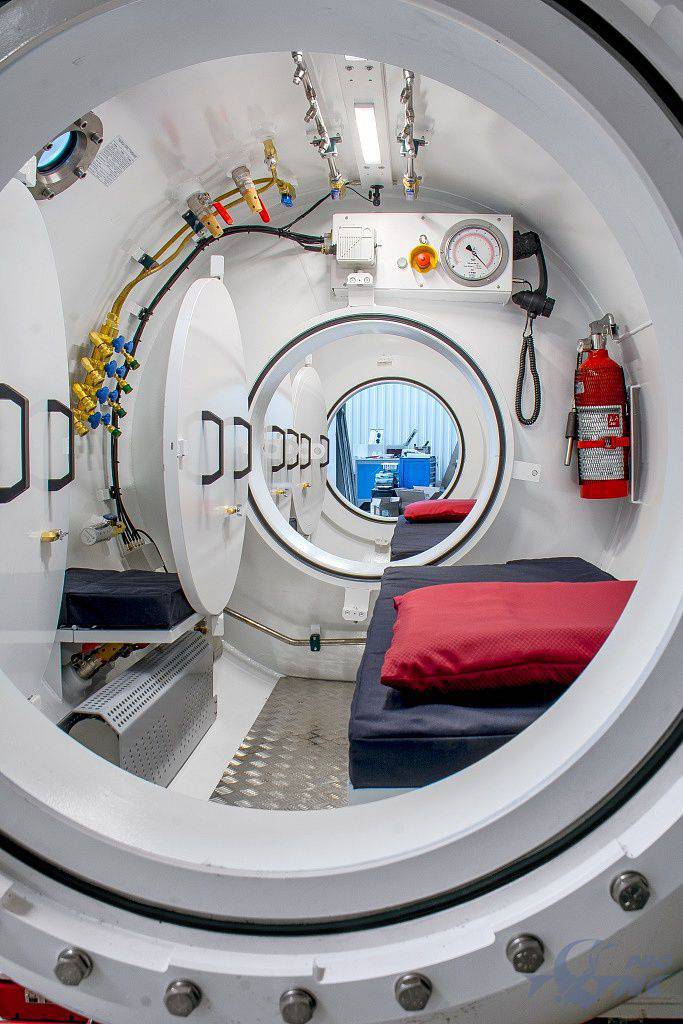
In many enterprises of the marine military industrial complex today there is a shortage of workers. Does Tethys Pro have a recruiting problem?
I am not in favor of saying that we have something, but not something. Everything is always somewhere in the middle. As such, there are no personnel problems, there is a continuous improvement in the personnel structure. For this, there is a system of training for already working people, our requirements are increasing and they require constant self-education, including. It depends on what is considered personnel problems. I will say that we even optimized: we reduced the number of employees, while increasing the volume of orders being fulfilled. This is certainly a time requirement and an attempt to minimize costs, but it is also an optimization. The impetus was just an increase in rates, an increase in the cost of products, because not only the exchange rate influenced this, in addition, prices for domestic components increased in Russia.
I noted that you have a lot of young employees in the company. What is the average age of the workers?
The average age of 45 years.
What does the company offer employees in addition to salary? Are there any social programs?
Instead of social programs, we have the opportunity to improve the professional level, that is, the training program. There is a bonus system, paid holidays, paid newsletters. The entire social insurance package, which involves our legislation, is fully available. For all employees there is medical insurance, special insurance for employees who go to work in the regions. Corporate events are held to rally the team and maintain a positive moral and psychological climate. Since we are all quite young, as you rightly noted, everyone has aspirations, and we give them the opportunity for a normal career. In our country, people grow, occupy higher positions, and their financial situation improves accordingly. This is a very serious motivation.
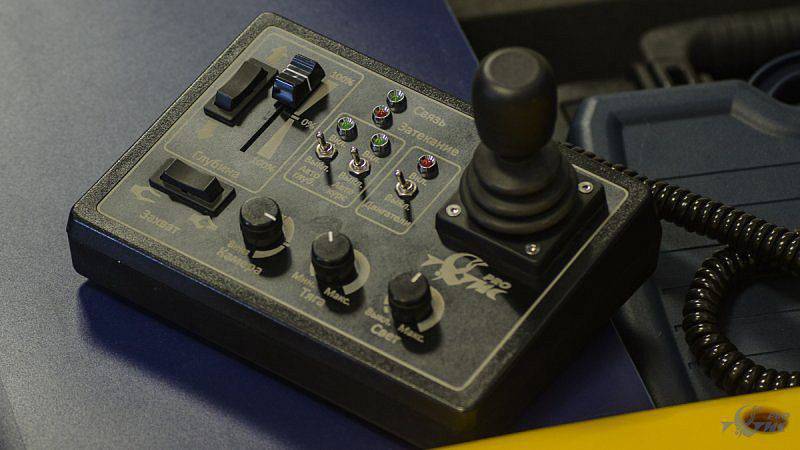
Training employees occur in Russia or abroad?
If it concerns the training of components or products that we import from abroad, then the employees are sent to the factory. Since we are members of the international association of contractors IMCA, which organizes safe underwater technical works around the world, we also send our own people to training there. This is done to ensure that our specialists comply not only with Russian standards, but also with international standards. Also, training is conducted on our base or other companies that specialize in this. Commercial and technical specialists are sent to specialized courses at institutes and universities.
Taking into account the fact that you constantly interact with young people, how can you assess the quality of education in Russian universities?
We have educational agreements with a number of universities, in particular with MGTU them. Bauman. First, students come to us to work practice, then to pre-diploma and then stay with us to work.
I have a feeling that the quality of education has improved. And we have no complaints about the basic knowledge of specialists who come. And then, having basic skills, to gain skills in specific jobs is already a subject of study in our company.
This is a convenient curriculum: students prepare in advance for what they will have to perform as part of their position. Specialists from MAI, the Maritime University, the Sechenov Academy with a high level come to me, I emphasize, basic education, and then everything depends on their will and our perseverance in order to equip them with exactly the skills and abilities that are necessary to fulfill their part of our team.
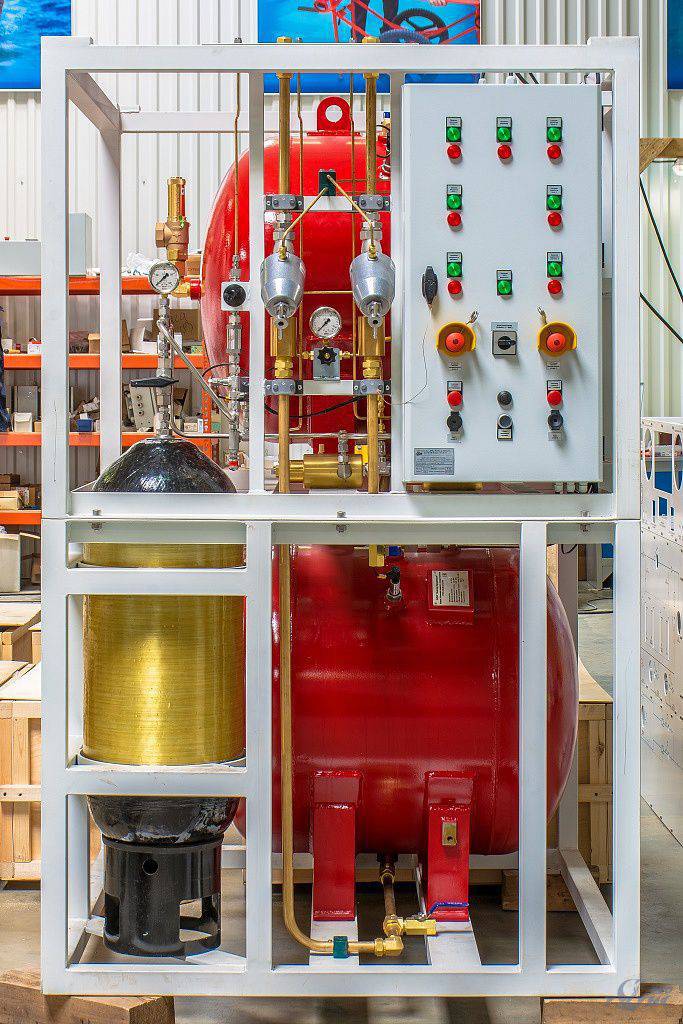
Returning to the service, were there any problems with the fact that the operators incorrectly serviced the equipment and it failed?
When we supply equipment, the contract often includes such a section as commissioning and training of personnel using our means. We are interested in the equipment to be operated correctly, so that later we do not have to spend resources to restore the technical readiness of a product. But any equipment during operation and especially at the time of operation in extreme conditions, in difficult hydrometeorological conditions at the limit of capabilities, sometimes fails. Sometimes the operators themselves are forced to exceed the permissible loads on a particular means in order to solve the rescue task, for example.
When it comes to saving a person, no user manual is already the first criterion for making a decision. If it is necessary to solve the problem in the shortest possible time, then even with the risk that this or that tool will fail or develop its resource, a decision is made on the successful completion of the main task.
In the event of a product or component failure, a notice is written, our specialist or a group of specialists travels, and a reclamation commission is held. Sometimes it turns out that this is a lack of technology, then we change the design or individual components to increase its reliability. In accordance with the established procedure, we make changes in the design documentation, conduct type tests, and then mass-produce equipment with other design solutions or using other materials.
Sometimes failures occur through the fault of personnel. Since our equipment is not in stock, but is constantly used, sometimes there are errors of operators. In such cases, a reclamation commission also meets, which in its conclusions indicates what happened in one or another case, and then the operator decides to improve the professional level of the staff. In some cases, they receive additional training at our base under the guidance of our specialists.
Operators of underwater vehicles also come to study?
Sometimes they come. But most often this training takes place in the amount of commissioning already at the facility. On the naval navy There is a training program for technical personnel serving uninhabited underwater vehicles, which provides for a certain amount of theoretical training, practical training and maintenance of qualifications, or their improvement. Each operator of an uninhabited underwater vehicle, in accordance with this program, has an operator’s booklet where his operating time, qualification level, which training programs he went through, and what kind of work he is ready and allowed for are indicated.
The operator of the underwater vehicle, if you think about it, has to work more with software, not with hardware. Tell us who writes "software" for your marine equipment?
For the devices that we produce, software is created by our specialists and we have a patent for it. Uninhabited underwater vehicles are patented by Tethys Pro. Accordingly, the software is also our product. As for the software for the systems we purchase, it is created according to our technical specifications, as well as any tool. First, we understand what the customer needs, agree on the technical requirements. After that, we formulate terms of reference and determine what we do on our own, what we do in Russia in cooperation with other manufacturers, and what we have to order abroad. Sometimes we want to do it abroad.
In this case, a technical task is formed, which is coordinated with potential partners. In case of confirmation of the manufacture of a product that meets our requirements, a schedule of control of the production is formed. Specialists travel to Russian enterprises abroad, and control its compliance with our technical specifications. If we talk about software, it is Russified by us and adapted for use in Russia by our customers and our computing equipment.
Tethys Pro has a very original development path for defense enterprises. You started with the supply of imported equipment and are now striving to develop full-scale production in Russia. In your opinion, did this approach justify itself?
This approach is not invented by us and is used everywhere. Of course, if we stand at the turn of the birth of a qualitatively new, not yet existing technical means, then it would be necessary to carry out research works, to attract teams and cooperation in order to subsequently proceed to the creation. But if the world already has a level of a certain technology, then to start its production, you must first reach this level, and then, starting from it, create something new. For the production of a bicycle, no one constructs it anew, takes an existing structure and adapts it to its production base. Questions of the same complexity - to create something and then produce serially. Some achievements, in particular during the Soviet era, suffered from the fact that we could create a remarkable prototype, but then did not have the production base for implementing this technology in mass-produced products. Based on this, we first investigate the level, that is, we use someone else's reserve. And starting from existing samples, we adapt them to our production and customer requirements.
We are a commercial enterprise and produce not technical means, but goods. The main difference of the product from the technical means is its demand. It should be needed, and not be gymnastics for the mind of designers.
Does Tethys research and development work at its own expense or at the expense of customers?
We, of course, participate in tenders and are happy to carry out research and development work with external financing.
But, unfortunately, in the last 15 years, the amount of work for our customers on our nomenclature to conduct R & D is small, so they are often unable to finance the development. In this regard, 80% of products that we produce, were created in an initiative order.
But the creation process is always carried out jointly with the customer, even at his own expense, in order for the product to become a commodity. To begin with, customer requirements are formed, after which a technical task is formed on the basis of these requirements. Based on the requirements of the technical specifications, a decision is made with our potential customers about what we will create. We stipulate the time of manufacture and characteristics of the product, but we do it for our money.
We are interested in such a mechanism of work, because then we get a product that the customer really needs. After we finish the development, we invite representatives of potential customers to the tests. They participate in the meetings of our commissions for preliminary testing, make their recommendations and observations, guided by which we are finalizing our samples.
Then, together with the customer, we make a decision on the readiness of this sample to conduct state tests. The customer creates a state commission that checks the sample for compliance. According to the results of state tests signed by the state act. And then it becomes a product created on its own initiative, but mass-produced by us and purchased by our customers.
Today they talk a lot about government support for the industry. We discussed OCD, but is there any other support from the state?
We have a commercial enterprise in which there is neither a state share, nor foreign capital. Everything belongs exclusively to the company.
In this regard, as such, the state support of our enterprise is not currently implemented. The best support of our state is the allocation of funds to order our products. Now the economic situation in the country is objectively improving, and in this connection our situation is also improving: the turnover, the number of employees is increasing, there are much more opportunities to create new product samples.
The best support is to maintain and increase the level of economic stability, investment in the development of our state. Our main customers are the Navy, other units of the Ministry of Defense, branch of service, types of Armed Forces, Emergency Situations Ministry, Federal Security Service, Ministry of Internal Affairs. When the state pays attention to these ministries and allocates them respective budgets, there is no better support for the state.
Our customer himself regulates the market, he will always choose the one who better and better fulfill the order. When he has the means for this, then for our company, for example, I don’t see better support. And we don’t participate in government programs to support small businesses, because we are not a small business, we are a serious taxpayer in our region.
That is, the main customers now are power departments?
Power agencies and rescue structures of Russia. For example, the Ministry of Transport is not a security agency, but has a number of subdivisions for underwater operations. So in other departments. Also Transneft, Gazprom, RusHydro, Rusenergoatom. Of course, the bulk of our turnover is government orders, but we also work in the open commercial market for small and medium-sized commercial enterprises that are engaged in underwater technical work. We do not do this work ourselves, but we are engaged in the production and supply of equipment for their production. That is, we provide those who perform these works.
As far as I know, now one of Tethys partners, KAMPO, is actively developing the shipbuilding industry. Tell us more about one of the most interesting projects - diving boats of the 23370 project. What are their advantages?
Their main advantages are quality and price, as well as the possibility of transportation and the modularity of their design. That is, having a production base, the final production of these boats can be carried out directly in the region of operation, which eliminates problems with the transportation of the vessel or boat to the place of its future basing. In addition, the boat is designed and manufactured as a universal carrier, a means on which you can install a wide range of different equipment. This process is provided by its power supply and structural elements. At the same time, the ability to install various equipment in different variations implies the performance of a wide range of tasks by the crew of the carrier. Using the boat platform, it is possible to solve the problems of diving descents, search and survey, preparation for ship raising, survey sites for the presence of underwater objects. For this purpose, various modules are installed on the deck of the vessel. In this regard, it is convenient and is now successfully operated in the fleets of the Navy.
The idea to supply equipment in container performance also came from abroad?
We have both stationary and container execution. Mobile complexes can be used on universal ships, in which case the installation of one equipment implies the removal of another. The set of installed equipment varies depending on the tasks performed.
If we talk about mobile decompression stations, that is, at the base of the car, they also come with removable container complexes and are designed to provide diving descents from the unequipped coast.
Abroad, there are also both stationary and mobile funds execution. Container options are convenient for upgrading existing facilities, since it does not require the construction or construction of a special vessel.
Is it possible to make in the container version complexes for the rescue of submariners?
Yes.
And your company such an order within the powers?
I think yes. We have already offered such options, because we already have such experience. There is a scientific and technical reserve in order to produce both simple rescue complexes in the container version and deep-sea diving complexes in the container version for installation on existing rescue vessels.
Do rescue complexes of container execution limit the depth is not limited?
Everything has its limitations. But container complexes can have the same performance characteristics as stationary ones.
That is, the same 450 meters, like the GVK-450, can be achieved using a container complex?
It is possible, but only using a specific carrier. Not every carrier can be equipped with such a tool, even in container design.
Production of container complexes faster production of stationary?
Not faster. Production of the complex itself may be faster, but bind to the vessel should still occur. It is not easy to bind a complex to a ship, especially if its design did not initially provide for this. In addition, in addition to the container complex, stationary equipment must be placed on the vessel to ensure its operation.
Reducing the maximum depth of the complex would accelerate its construction?
What sense of speed what?
Now in Russia there are no deep-sea rescue complexes for submariners. GVK-450 your production is only being built. But, nevertheless, they are needed right now. In our investigation, we found out that submarine accidents mostly occur at depths up to 200 meters.
If we speak not about diving, but about rescue work, then it’s not the depth that plays a role. The meaning of the rescue complex is to conduct decompression of submariners who were in an emergency submarine under increased pressure. If we talk about the rescue ship "Igor Belousov", then a diving and rescue complex is installed on it, which provides for both rescue and diving work. If we talk only about rescue tasks, then even existing carriers can be equipped with container rescue complexes. Our company is ready to do this, and we expounded these proposals to the Navy.
If the complex GVK-450 was ordered today, what percentage of localization of production could be achieved?
It is premature to talk about it, because only the operation of the complex will show which domestic parts and components should be used and what should be replaced.
We spoke with our partner, and they are ready to transfer a number of technologies to us for the production of such complexes in Russia. To do this, again, it is necessary to prepare the production. Once again, I repeat that the possession of technology is not equal to the possibility of organizing production. You can have the technology, but be unable to implement it. Often this is a stumbling block for manufacturers.
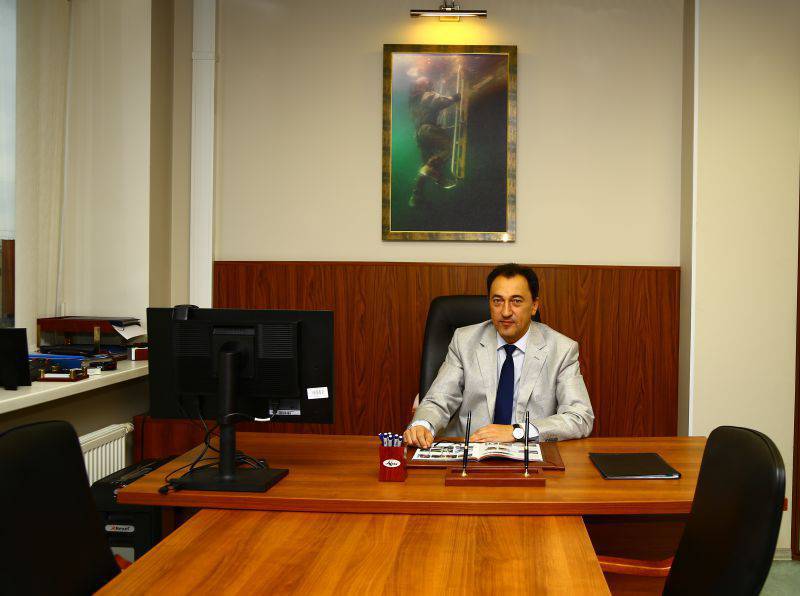
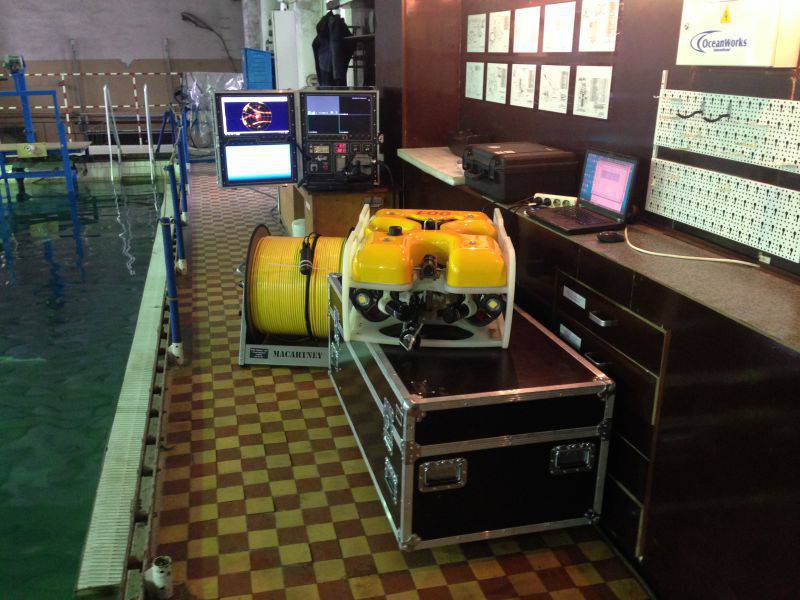
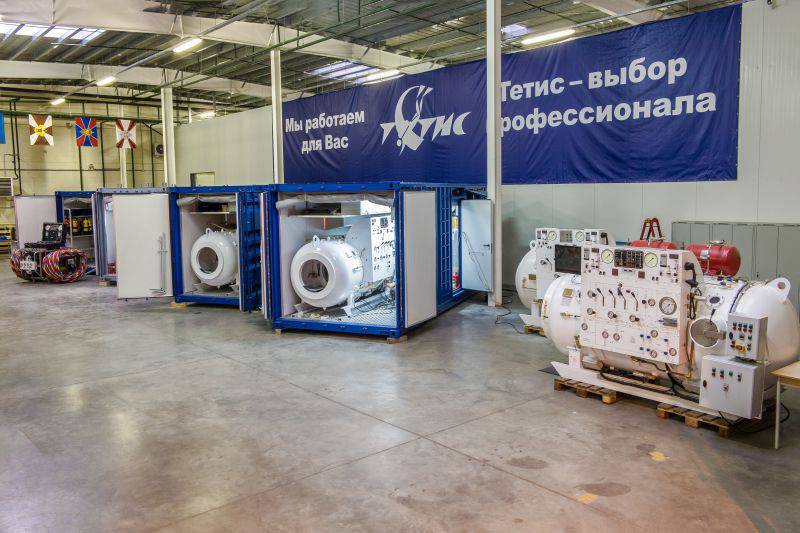
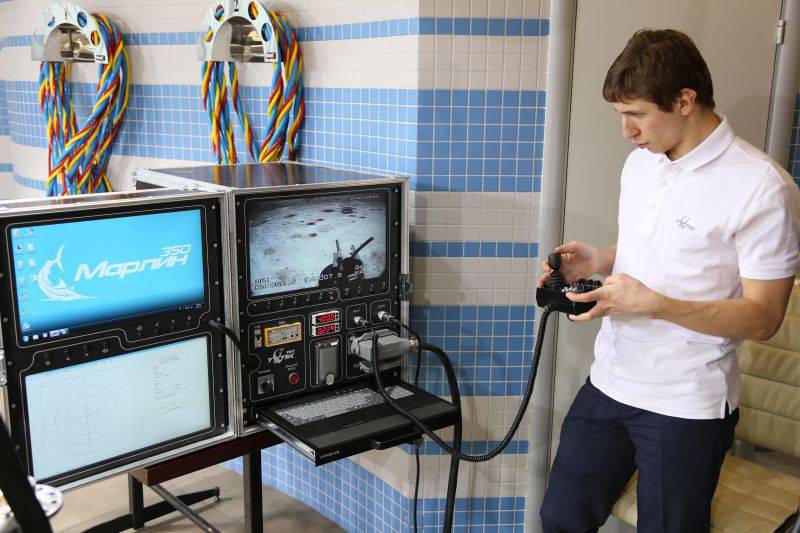
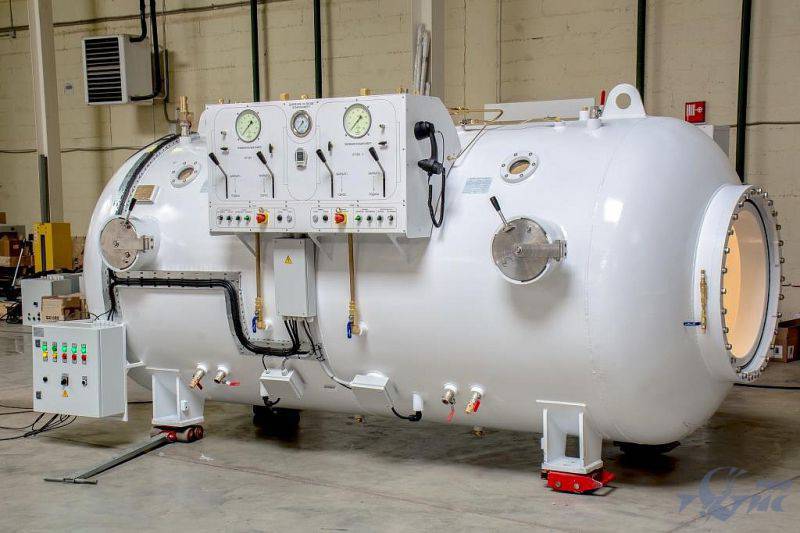
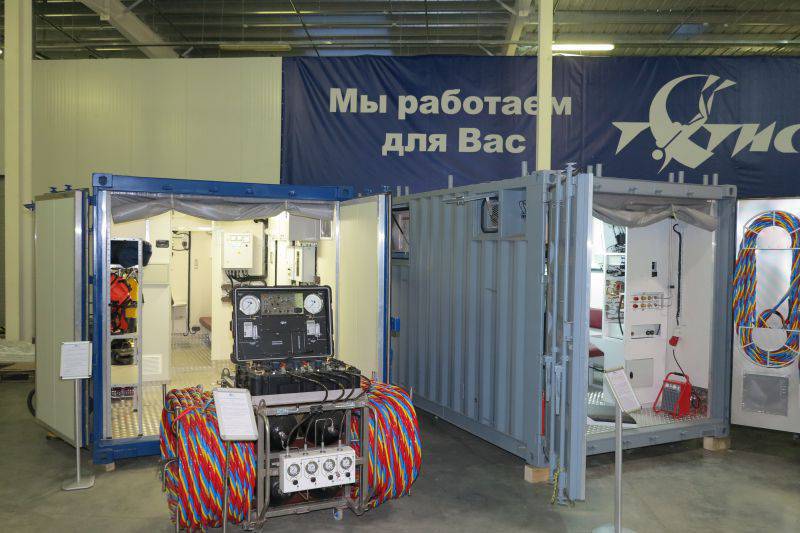
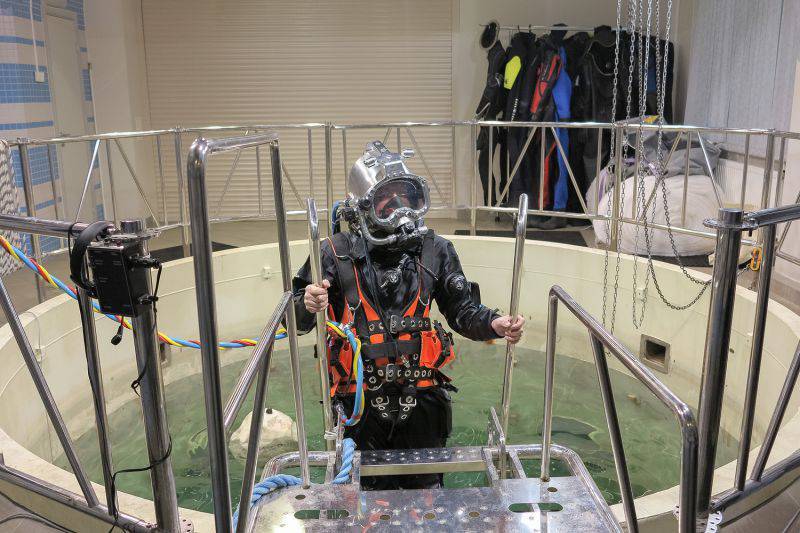
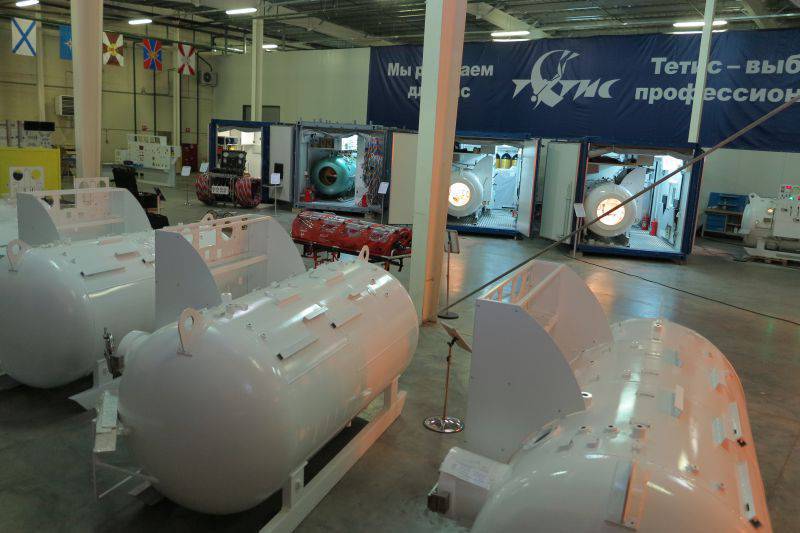
Information